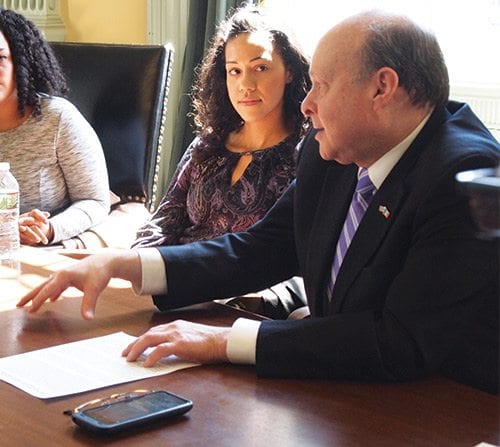Black advocates meet with state legislators
Call for regular discussion of black community’s concerns

Residents of black communities and state legislators are going to get to know each other — or such was the goal of the approximately 20 activists, nonprofit leaders and political aides who gathered at the State House last Thursday for a “Black Community Grassroots Leadership Advocacy Day.” During the event, residents sat down with legislators to discuss a spread of community concerns. Their asks ranged from more funding for special education to terms that would give black communities an equal shot at the marijuana business.
More than highlighting any one issue, the event was geared toward creating a regular line of communication between black communities and state legislators.
“They don’t often hear from us,” Zakiya Alake, Union of Minority Neighborhoods representative to the Mass Alliance Against Predatory Lending, told the Banner.
Most often, if members of the black community visit the State House, it is to lobby on a specific cause, such as AIDS or preschool funding, Alake said, but not on general concerns.
Other interest groups, such as labor groups and LGBT advocacy groups visit legislators several times a month, Horace Small, executive director of the Union of Minority Neighborhoods, told the Banner. Blacks need to be similarly visible, said Dan Delaney, member of UNM’s board of directors, and should visit the State House each quarter or at least twice a year.
“This is an opportunity to begin to change the paradigm on how we do business with our elected leaders,” Small said, speaking to the Banner before the event. “We desperately need to begin to start showing our collective clout.”
There are six black members of the 200-member state legislature, and Small said relying on those in office is not sufficient.
“If we’re waiting for the [Black and Latino] Caucus to tell us what’s going on, we’ll never find out.”
Progressive Black Democrats of Massachusetts
The day also marked the launching of the Progressive Black Democrats of Massachusetts. The group was created to ensure that discussions started during the advocacy day continue, and it will promote political engagement in the black community, according to Horace Small. Such efforts include offering assistance with voter registration, training on how to run for office, and — as was seen in an advice sheet distributed on the advocacy day —informing on strategies for most effectively communicating with legislators. For instance, Alake explained, when advocating, it is crucial to tie your personal story to a specific ask, such as a budget line item or proposed bill.
Variety of asks
Advocates sought to insert their voice during a critical time — state budget negotiations. That day, the House passed its $39.6 billion budget bill for fiscal year 2017, handing off budget deliberation to the Senate. Following the Senate’s own proposal, House and Senate legislators will have to compromise and pass a budget that wins governor approval before the fiscal year begins July 1.
Speaking with advocates, Senate President Stan Rosenberg noted another important date: on May 18, the Senate and House meet for a Constitutional Convention.
Issues such as education, housing, senior services, services for the disabled, health care, unemployment insurance and the MBTA “will be taking significant hits” if the budget the House was examining passed, warned a Facebook announcement of the Advocacy Day. The statement also asserted that “issues that matter to us as a Black community such as summer jobs, violence prevention, business development and economic stimulation have not been discussed.”
While the House’s proposal allocates $9 million for summer jobs for at-risk youth, Small said there is no guarantee the Senate will retain this in its version of the budget and said he has deep concerns.
Other items aired during a meeting with Rosenberg and Sens. William Brownsberg and James Eldridge and a following one with Rep. Michelle DuBois and Sen. Linda Dorcena Forry, included a call for a Homeless Bill of Rights as well as greater funding for rental vouchers and homelessness relief services.
“We see voucher holders that cannot even rent in the city of Boston,” because of the prices, said City Mission’s Rev. June Cooper. She added that she some of those her organization worked with have experienced rent increases of 200 percent.
Toni Saunders of Associated Advocates said special education funding must rise to meet needs. Shanel Lindsay of Ardent Cannabis worried that laws that prevent those convicted for marijuana use from running a dispensary could block minorities from the sector disproportionately.
“Minorities were largely shut out of the process,” Lindsay said. “No minorities own the [medical marijuana] dispensaries in Massachusetts.”
Potential movement
There is activity underway to address some of these issues, several legislators said. Income inequality is among the top four priorities of the Senate, Rosenberg told the advocates, pointing to last year’s increase in minimum wage and earned income tax credit. He added that during the May Constitutional Convention, legislators will discuss a proposed 4 percent surtax on those earning more than $1 million, with the revenue targeted for education and transportation.
Several legislators also encouraged advocates to continue to request meetings with electeds.
“Our doors are wide open,” Rosenberg said.






